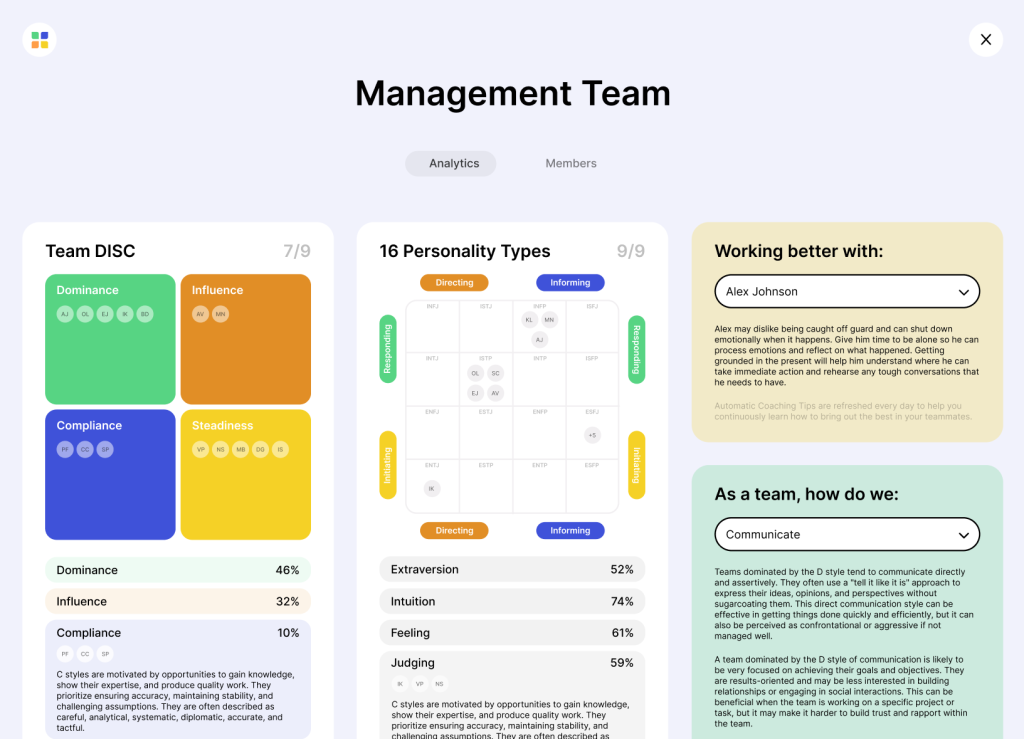ISFJ is one of the personality types identified by the Myers-Briggs Type Indicator, or in short MBTI personality test, based on four categories of preferences.
ISFJ stands for Introversion, Sensing, Feeling, and Judging. They are further grouped into two types, the ISFJ-A and ISFJ-T. The distinction is based on their responses to the challenges thrown at them. This reflects the confidence an ISFJ has in their skills and abilities.
The ISFJ meaning is responsible for this personality’s quirky nature. Reserved yet passionate, with a rich inner world, yet practical and analytical on the outside. Given the title The Defender, ISFJs are loyal individuals who are known for their integrity and commitment.
A Different Shade of ISFJ: How a Turbulent and Assertive Defender Differs from Each Other
Friendships
While sensitivity is a common trait for Defenders, ISFJ-T types place higher regard on people’s emotions than ISFJ-As.
Being self-critical, they are more likely to ask for their friends’ opinions before making any decision compared to the bolder ISFJ-As.
Their confidence, along with their lower sensitivity, may lead the Assertives to quickly provide opinions and advice without having enough information about their friends’ needs and wants.
Relationships
Due to their sensitive nature, ISFJ in relationships may struggle with feelings of inadequacy. This is especially true for turbulent types. Seeing many flaws within themselves, they may blame themselves for any emerging problems.
While Assertive types will also acknowledge responsibility and perceived failures, they are more able to release their worries and are less affected by them.
Assertive types are also likely to focus on the positive aspects of the situation due to their optimistic outlook. However, this may draw their attention away from real problems surfacing in the relationship.
Workplace
ISFJs are known for their keen awareness to details and ability to detect subtle changes in their environments.
However, due to their more cautious and critical nature, studies show that Turbulent types have greater awareness than their Assertive counterparts. This vigilance also allows them to detect problems in the workplace and find better solutions.
However, when it comes to handling problems, Assertive types can manage the current status of things instead of ruminating on how things should be, as Turbulents do.
ISFJ-As are also better at recognizing when they have no control over the situation, allowing them to drop these matters, compared to ISFJ-Ts who are more likely to hold on and strive until they see changes.
Working in a Team
While both Defenders are committed and responsible, ISFJ-Ts are more likely to take on more responsibility and solve every negative situation they see in the workplace. This may lead to them spreading themselves too thin.
While both are not comfortable with the spotlight, Assertive Defenders are more proactive and confident than their Turbulent peers.
This allows them to be more visible in the workplace and maybe why ISFJ-T types report more recognitions and awards than their Assertive counterparts.
Strengths and Weaknesses of the ISFJ-A and ISFJ-T
Strengths of Assertive Defenders (ISFJ-A)
- Optimistic
Even when faced with a difficult situation, Assertive Defenders are less likely to become overwhelmed than Turbulent types. They can look at the brighter side of things, allowing them to move forward
- Decisive
Compared to their cautious neighbors who take more time in weighing situations, Assertive types are relatively quicker at acting and deciding.
This is also because the opinions of other people weigh less on them compared to their Turbulent peers. This allows them to be bolder in taking actions, sometimes to a fault.
- Visible
While both types shy away from the limelight, ISFJ-As are more confident than their turbulent peers. This attitude allows them to be more visible and less timid with their skills and talents.
The list of all ISFJ strengths and weaknesses can be found here.
Weaknesses of Assertive Defenders (ISFJ-A)
- Less sensitive
ISFJs are sensitive by nature. However, if both subtypes are compared side by side, Assertives would appear less perceptive than their careful, conscientious neighbors.
They may not be as cautious when listening and value other peoples’ opinions of them less. This insensitivity, if paired with the tendency to “fix people,” a common problem of ISFJ in relationships, may cause further problems down the road.
- May miss out on details
Their tendency to move forward and not dwell on problems and negativities may cause ISFJ-As to miss particulars that their counterparts find no trouble seeing. Their confident nature may cause them to quickly jump into action or assume what others may want or need.
Strengths and Weaknesses of Turbulent Defenders (ISFJ-T)
Strengths of Turbulent Defenders (ISFJ-T)
- Foresees problems
ISFJs are gifted with sensitivity that allows them to quickly sense when something is amiss or when a person needs further attention.
Turbulents are more detail-oriented than Assertives, possibly because of their cautious nature. This allows them to spot problems that are already present and prevent new issues from springing up.
- Good listeners
ISFJs are known for their ready shoulders. While both are good listeners, the more sensitive Turbulents are more concerned and take more time to understand where people are coming from.
They are not as quick to offer solutions or advice as their Assertive counterparts, something people appreciate a lot, especially when they simply want to be heard.
- Very responsible
Aside from loyalty, their responsibility is one of the ISFJ strengths they are known for. However, the critical and sensitive nature of ISFJ-Ts heightens this sense of commitment.
While their Assertive counterparts know when things are out of hand and can drop them, the ISFJ-T’s high personal standards enable them to come through obligations.
Weaknesses of Turbulent Defenders (ISFJ-T)
- Worriers
ISFJ-Ts may struggle with dropping things they cannot control. While their counterparts find it easier to let go of problems and mistakes, ISFJ-Ts may tend to worry even about the things they have little control of.
Aside from this, people’s opinions matter a lot to them. They may become too self-conscious, worrying too much about their image and others’ perception of them.
This may not only slow them down but may also put an undue burden on them.
- Easily burdened
A weakness common to ISFJ types is their difficulty with boundaries. However, the high perceptiveness and sensitivity of Turbulent types may tend to worsen this problem.
They may easily detect problems and become burdened with the responsibility to fix everything. The same goes for other people’s problems and needs.
They may feel that they have the responsibility to meet people’s needs, especially those they value and feel inadequate if unable to meet them.
Jobs and Career Paths that Suit ISFJ-Ts
Preferred ISFJ job paths include those with established social structures and those that offer a harmonious working environment.
Turbulent types further excel in jobs that require great attention to detail. Moreover, jobs that include helping others and listening fit the ISFJ-T’s thoroughness and a strong commitment to service.
5 Best Career Choices for ISFJ-Ts
- Social worker
- Interior Manager
- Researcher
- Healthcare worker
- Administrative Assistant
Jobs and Careers ISFJ-Ts Should Avoid
- Journalist
- Sales Manager
- Financial Manager
- Marketing Manager
- Emergency Medical Response
Jobs and Career Paths that Suit ISFJ-As
5 Career Choices that are ISFJ-As
- Nurse
- Bookkeeper
- Librarian
- Office Manager
- Technical support
Jobs and Careers ISFJ-Ts Should Avoid
- Executive
- Management Consultant
- Mechanical Engineer
- Art Director
- Actor
Subtypes ISFJ-A and ISFJ-T FAQs
While people with the same personality types don’t often get along, surprisingly, two ISFJs are perfectly compatible with one another. The reason is that they’re both very responsible and reliable personalities that consider relationships something serious.
They don’t like social gatherings but prefer to spend time in each other’s company and share their feelings with one another. As a result, they make an ideal couple.
In addition, the ISFJ personality is compatible not only with ISFH but with other SJ (sensing and judging) MBTI personality types too.
What’s the difference between ISFJ-T and ISFJ-A?
ISFJ-T and ISFJ-A are two subtypes of ISFJ personality. While T stands for Turbulent personality, A is short for Assertive personality. The difference between these two subtypes is that ISFJ-T types tend to be self-critical.
They find it hard to remain calm during times of stress and feel uncertain. Consequently, they often ask for others’ opinions before making decisions. ESFJ-A types, on the other hand, are more relaxed and calm individuals.
Assertive ISFJs don’t really worry about things that can be fixed. Besides, they are more focused on themselves, while ISFJ-Ts try to take care of others’ feelings more than their own.
Who is ISFJ-T compatible with?
The MBTI personality type that is considered the most compatible with ISFJ-T in romantic relationships or friendships is ESFJ-A or ESFJ-T. The reason is that these two personalities share three basic traits, including sensing, feeling, and judging.
They both enjoy sharing their feelings and easily understand others’ emotions. They tend to live in the present moment and prefer things to be settled. Although ESFJ is an extrovert type, they balance each other when it comes to social occasions.
Furthermore, ISFJ-T is compatible with both the turbulent and assertive subtypes of ISFP, ISTJ, and ISFP. Each of these personality types has compatible functions of introverted sensing (Si) and extroverted sensing (Se).
How rare is the ISFJ-T personality type?
Generally, ISFJ is the most common personality type among all MBTI personalities. In fact, ISFJs make up about 14% of the general population. However, when it comes to ISFJ subtypes, it turns out that ISFJ-T subtypes aren’t as common as ISFJ-A.
This means that the majority of ISFJs in the population tend to be Assertive subtypes. Still, Turbulent ISFJs are still more common than plenty of other personality types, such as INTJs or ENTJs.


